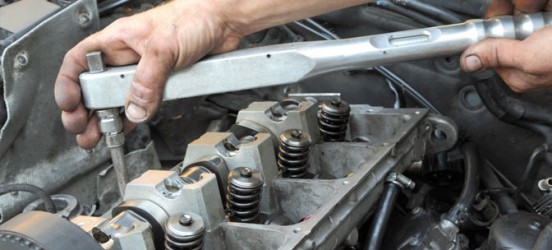In most cases, diesel engines don’t require as many repairs as gas-powered engines. However, they can be more expensive if regular and professional diesel maintenance isn’t performed. Here are ten common diesel repairs that you should know about.
Diesel Maintenance – 10 Common Repairs
1. Lack of Power
A fairly common fuel related problem manifests itself by exhibiting a lack of power. Problems like starting or accelerating can be connected to a loose throttle linkage, dirty fuel filters, excessive lubrication and problems with the vehicle’s fuel injectors.
2. Difficult Time Starting
Having a difficult time starting your truck is a sign of a fuel delivery problem or low compression. It’s normal for diesel engines to crank slightly when started, however, if you’re having a noticeably tough time starting the vehicle, or it won’t start at all, you’ll need to take it to a technician who is trained in diesel maintenance.
3. Fuel Contamination
Because diesel is much more viscous than gasoline, it’s easier to contaminate. The four most common, equally dangerous, fuel contaminants include water, soot, dilution, and glycol. If any of these contaminants end up penetrating the fuel system, it can lead to major engine problems.
4. Oil Oxidation
Diesel trucks that are left sitting for a long period of time, or that aren’t driven regularly, usually have issues that include oil oxidation. This means that air gets into the oil, creating bubbles that interfere with the appropriate lubrication. When oil oxidation occurs, it can damage the engine. Even if you don’t think the oil has been effected, it should be changed after the vehicle has been sitting idle for an extensive period.
5. A Black Exhaust Problem
Black exhaust is usually due to an imbalance of air to fuel proportions, typically caused by an excess of fuel and not enough air. A malfunctioning air filter, injector or injector pump, turbocharger or EGR valve could be causing the problem. Not only does black exhaust make it difficult to breathe and stink up your vehicle, but you can also end up dealing with a substantial fine for overlooking the clean air regulations in your state
6. Malfunctioning Lead/Acid Storage Batteries
When a storage battery malfunctions, it causes an imbalanced compression ratio, negatively affecting the starter system. Because there’s usually a lot of pressure put on the lead/acid storage battery, it ends up being an important component in the diesel engine’s starter system.
7. The Wrong Weight Viscosity
Hard starting is frequently the consequence of the wrong weight viscosity of engine lubrication. Viscosity in diesel lubricants is much higher than in gasoline, and a lot of people that perform DIY diesel maintenance get the viscosity weight wrong when they replace the oil. In other cases, they’ll use a single-weight engine oil during the hot summer months and forget to go back to multi-viscosity oil when the weather gets cold again.
8. Excess Noise
The noise coming from a diesel engine can be considerable, and in some cases, it can be a sign that something’s wrong. If you notice an unfamiliar knocking or other inconsistent noises, it could be a sign that there’s something wrong with the fuel injectors, which will affect the compression balance and reduce performance.
9. Increased Compression Ratio
Most diesel engines have a 20:1 compression ratio, in comparison to the typical gas-powered engine that has an average ratio of 8:1. It’s the high compression ratio that makes the diesel engine run smooth, powerful and efficient. Unfortunately, it can also end up causing issues. For instance, it’s high compression ratio can end up causing the engine to knock more often because of a bad burn pattern, and in some cases, can contribute to fuel injection complications.
10. Humidity Problems
Water can also pollute the lubricant in a diesel engine sometimes causing major complications, including interfering with the lubrication process, leading to a seriously damaged engine. If the vehicle sits for too long in rainy or humid conditions, the moisture will increase oxidation, attack additives, and cause the engine to knock.
For more information regarding diesel, maintenance click here.







Join the discussion 3 Comments